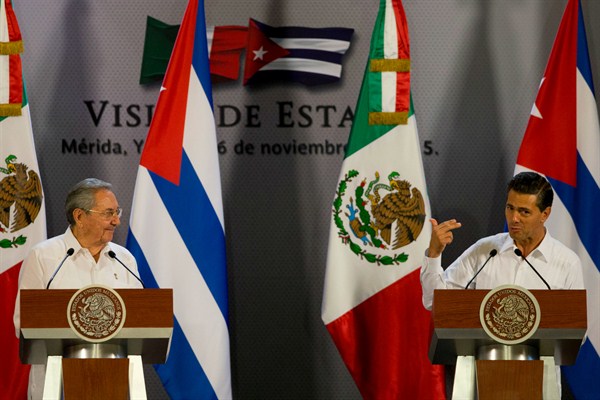With his state visit to Mexico earlier this month, Raul Castro took a major step forward in rebuilding Cuba’s relations with the country in Latin America that is most important to the United States. For Mexican President Enrique Pena Nieto, the summit marked the culmination of his efforts to repair relations with Cuba after a decade of antagonism precipitated by Mexico’s conservative governments led by the National Action Party, or PAN, beginning with the presidency of Vicente Fox from 2000 to 2006.
Historically, Pena Nieto’s Institutional Revolutionary Party, or PRI, had maintained friendly relations with Cuba’s revolutionary government after 1959. The PRI’s nationalism, its commitment to nonintervention, and its own revolutionary heritage made it instinctively resistant to U.S. attempts to overthrow the Cuban revolution. As Castro noted in his remarks at the summit, Mexico was the only Latin American country that refused to go along with the Organization of American States (OAS) 1964 mandate that members break all diplomatic and commercial ties with Cuba. (Although, to avoid angering Washington, Mexico also agreed to share intelligence gathered from its diplomatic mission in Havana.) In gratitude, as Fidel Castro acknowledged in his autobiography, Cuba abstained from supporting armed insurgency in Mexico. Over the ensuing decades, Mexico tried repeatedly, albeit without success, to broker diplomatic rapprochement between Cuba and the United States.
But when Fox won the presidency in 2000, defeating the PRI for the first time since its founding in 1929, he adopted a policy toward Cuba much closer to Washington’s. Although Fox’s government continued to oppose the U.S. economic embargo against Cuba, he was outspoken in his criticism of Cuba’s lack of democracy and violations of human rights—far more than any PRI government had ever been. When Fox visited Cuba in February 2002, he offended Castro by meeting with Cuban dissidents.

